
eBook - ePub
Easy Learning French Conversation
This is a test
- English
- ePUB (mobile friendly)
- Available on iOS & Android
eBook - ePub
Easy Learning French Conversation
Book details
Book preview
Table of contents
Citations
Frequently asked questions
How do I cancel my subscription?
Can/how do I download books?
At the moment all of our mobile-responsive ePub books are available to download via the app. Most of our PDFs are also available to download and we're working on making the final remaining ones downloadable now. Learn more here.
What is the difference between the pricing plans?
Both plans give you full access to the library and all of Perlego’s features. The only differences are the price and subscription period: With the annual plan you’ll save around 30% compared to 12 months on the monthly plan.
What is Perlego?
We are an online textbook subscription service, where you can get access to an entire online library for less than the price of a single book per month. With over 1 million books across 1000+ topics, we’ve got you covered! Learn more here.
Do you support text-to-speech?
Look out for the read-aloud symbol on your next book to see if you can listen to it. The read-aloud tool reads text aloud for you, highlighting the text as it is being read. You can pause it, speed it up and slow it down. Learn more here.
Is Easy Learning French Conversation an online PDF/ePUB?
Yes, you can access Easy Learning French Conversation by in PDF and/or ePUB format, as well as other popular books in Languages & Linguistics & French Language. We have over one million books available in our catalogue for you to explore.
Information
Small talk
Comment ça va? – How are things?
Whether you’re going to be working in a French-speaking country or you’re going to spend some time with your French-speaking friends, you’ll want to be able to chat with people and get to know them better. The phrases in this unit will help you talk naturally to friends, family and colleagues in a number of everyday situations.
GREETINGS
Just as in English, there are several ways of greeting people in French, depending on who you are addressing, and whether you want to be formal or not. Say bonjour, madame/mademoiselle/monsieur if you want to sound polite and just bonjour to someone you know a little. If you’re on friendly terms with someone, you can say salut! (hi!).
Hello…
| Bonjour. | Hello. |
| Bonjour, madame. | Good morning. |
| Bonjour, Pierre. | Good afternoon Pierre. |
| Salut, Olivier! | Hi Olivier! |
| Bonsoir. | Good evening. |
BON À SAVOIR!
In French there is no equivalent for good morning and good afternoon – people just say bonjour during the day or bonsoir in the evening.
Use au revoir, madame/mademoiselle/monsieur to say goodbye to people you don’t know well. You can just say au revoir to people you know, or use salut! (bye!) if you are on friendly terms with them.
Goodbye…
| Au revoir, monsieur. | Goodbye. |
| Au revoir, mademoiselle. | Goodbye. |
| Salut! | Bye! |
| Bonsoir. | Goodnight. |
See you…
| À plus tard! | See you later! |
| À demain! | See you tomorrow! |
| À lundi! | See you on Monday! |
INTRODUCING PEOPLE
You may want to introduce people you know to one another. The simplest way is by saying voici (this is) when introducing a person. You can also use je te présente (I’d like you to meet) when addressing someone you know well, or je vous présente to be more formal or when speaking to several people.
This is…
| Voici mon mari, Richard. | This is my husband, Richard. |
| Voici mes enfants: Andrew, Gordon et Emma. | These are my children, Andrew, Gordon and Emma. |
| Je vous présente Danielle. | I’d like you to meet Danielle. |
| Je te présente Kevin, mon compagnon. | I’d like you to meet Kevin, my partner. |
BON À SAVOIR!
When you’re introduced to someone, you’ll want to know how to react. The traditional enchanté should only be used in formal or business situations these days, and very often people just say bonjour.
TALKING ABOUT YOURSELF
In order to get the conversation going, you’ll want to be able to talk about yourself – wh...
Table of contents
- Title page
- Copyright
- Contents
- Introduction
- French pronunciation
- Units
- Grammar
- Verb tables
- Vocabulary builder
- About the publisher